Information Technology Ethics Assignment - Analysis of Cases
VerifiedAdded on 2023/06/03
|9
|1935
|378
Homework Assignment
AI Summary
This assignment delves into critical aspects of information technology ethics, analyzing three key case studies through the lens of ethical frameworks and professional conduct. The first case examines the ethical implications of Edward Snowden's whistleblowing, focusing on privacy rights and data surveillance by the National Security Agency. The second case explores the violation of privacy rights, specifically the recording and release of private remarks by V. Stiviano, examining the ethical considerations of whistleblowing and privacy infringement. The final case addresses the violation of intellectual property rights concerning software usage. The assignment further incorporates the ACS code of professional conduct, emphasizing public interest, quality of life, competence, and professionalism. The document analyzes the ethical dilemmas presented by each scenario, evaluating the stakeholders affected, ethical issues and implications, and potential solutions, along with references to relevant literature.
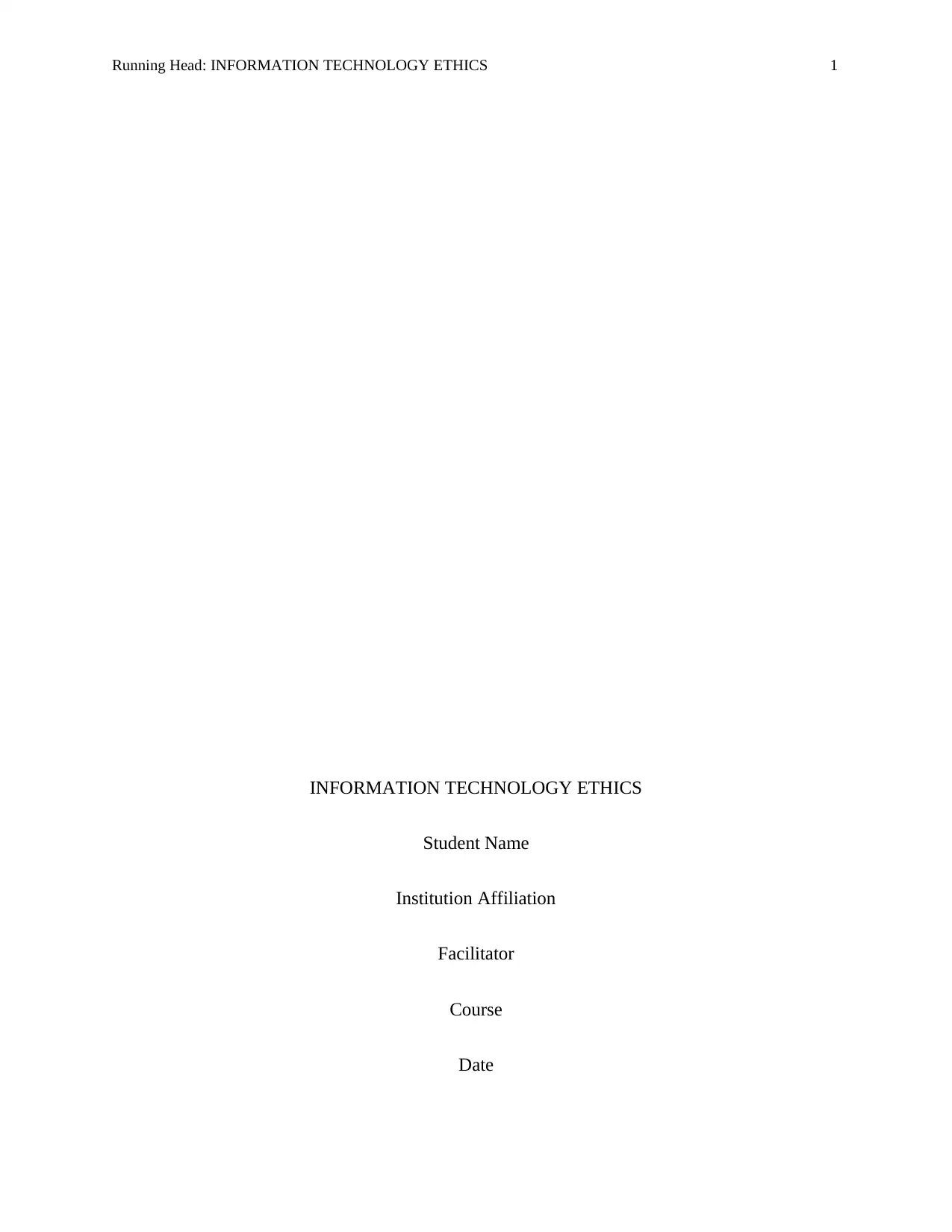
Running Head: INFORMATION TECHNOLOGY ETHICS 1
INFORMATION TECHNOLOGY ETHICS
Student Name
Institution Affiliation
Facilitator
Course
Date
INFORMATION TECHNOLOGY ETHICS
Student Name
Institution Affiliation
Facilitator
Course
Date
Paraphrase This Document
Need a fresh take? Get an instant paraphrase of this document with our AI Paraphraser
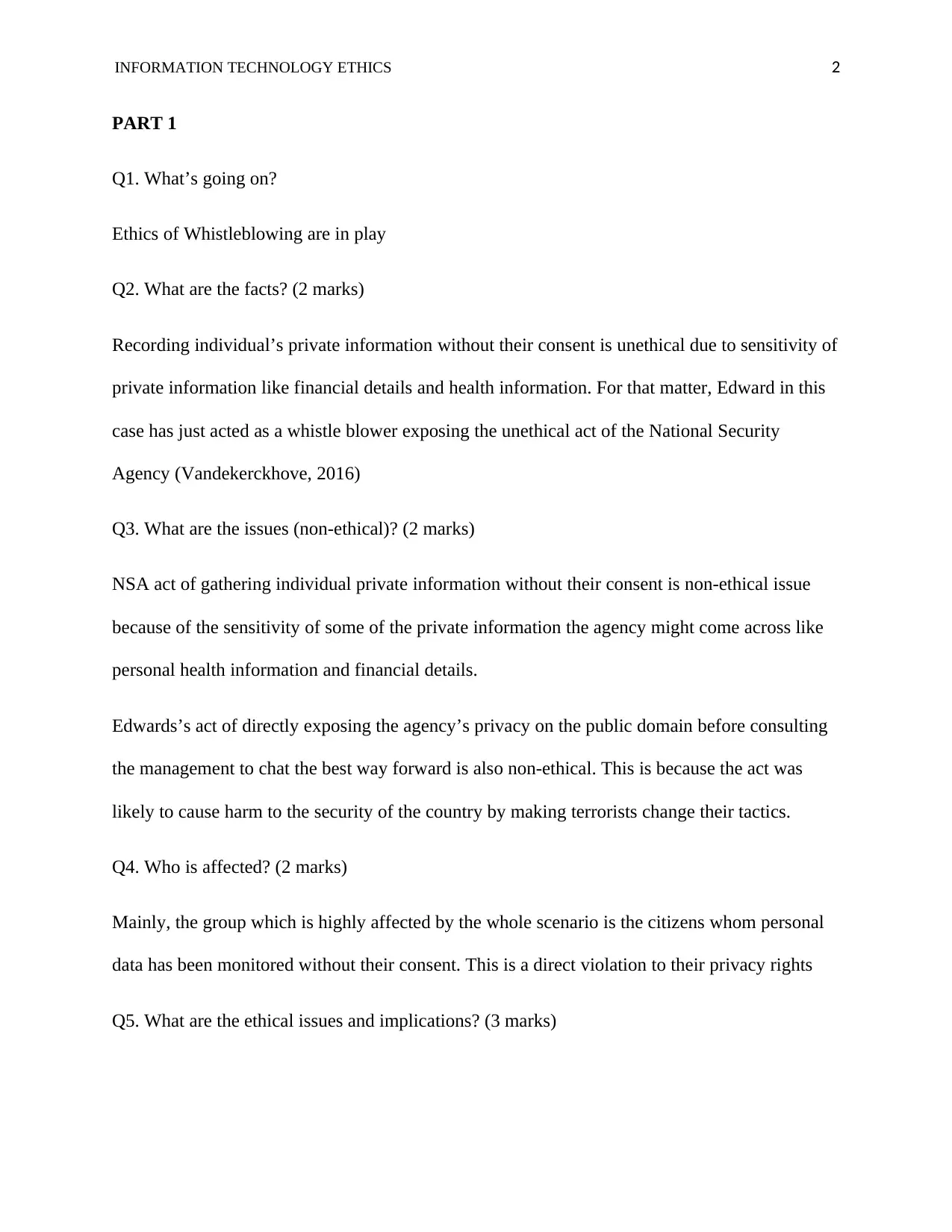
INFORMATION TECHNOLOGY ETHICS 2
PART 1
Q1. What’s going on?
Ethics of Whistleblowing are in play
Q2. What are the facts? (2 marks)
Recording individual’s private information without their consent is unethical due to sensitivity of
private information like financial details and health information. For that matter, Edward in this
case has just acted as a whistle blower exposing the unethical act of the National Security
Agency (Vandekerckhove, 2016)
Q3. What are the issues (non-ethical)? (2 marks)
NSA act of gathering individual private information without their consent is non-ethical issue
because of the sensitivity of some of the private information the agency might come across like
personal health information and financial details.
Edwards’s act of directly exposing the agency’s privacy on the public domain before consulting
the management to chat the best way forward is also non-ethical. This is because the act was
likely to cause harm to the security of the country by making terrorists change their tactics.
Q4. Who is affected? (2 marks)
Mainly, the group which is highly affected by the whole scenario is the citizens whom personal
data has been monitored without their consent. This is a direct violation to their privacy rights
Q5. What are the ethical issues and implications? (3 marks)
PART 1
Q1. What’s going on?
Ethics of Whistleblowing are in play
Q2. What are the facts? (2 marks)
Recording individual’s private information without their consent is unethical due to sensitivity of
private information like financial details and health information. For that matter, Edward in this
case has just acted as a whistle blower exposing the unethical act of the National Security
Agency (Vandekerckhove, 2016)
Q3. What are the issues (non-ethical)? (2 marks)
NSA act of gathering individual private information without their consent is non-ethical issue
because of the sensitivity of some of the private information the agency might come across like
personal health information and financial details.
Edwards’s act of directly exposing the agency’s privacy on the public domain before consulting
the management to chat the best way forward is also non-ethical. This is because the act was
likely to cause harm to the security of the country by making terrorists change their tactics.
Q4. Who is affected? (2 marks)
Mainly, the group which is highly affected by the whole scenario is the citizens whom personal
data has been monitored without their consent. This is a direct violation to their privacy rights
Q5. What are the ethical issues and implications? (3 marks)
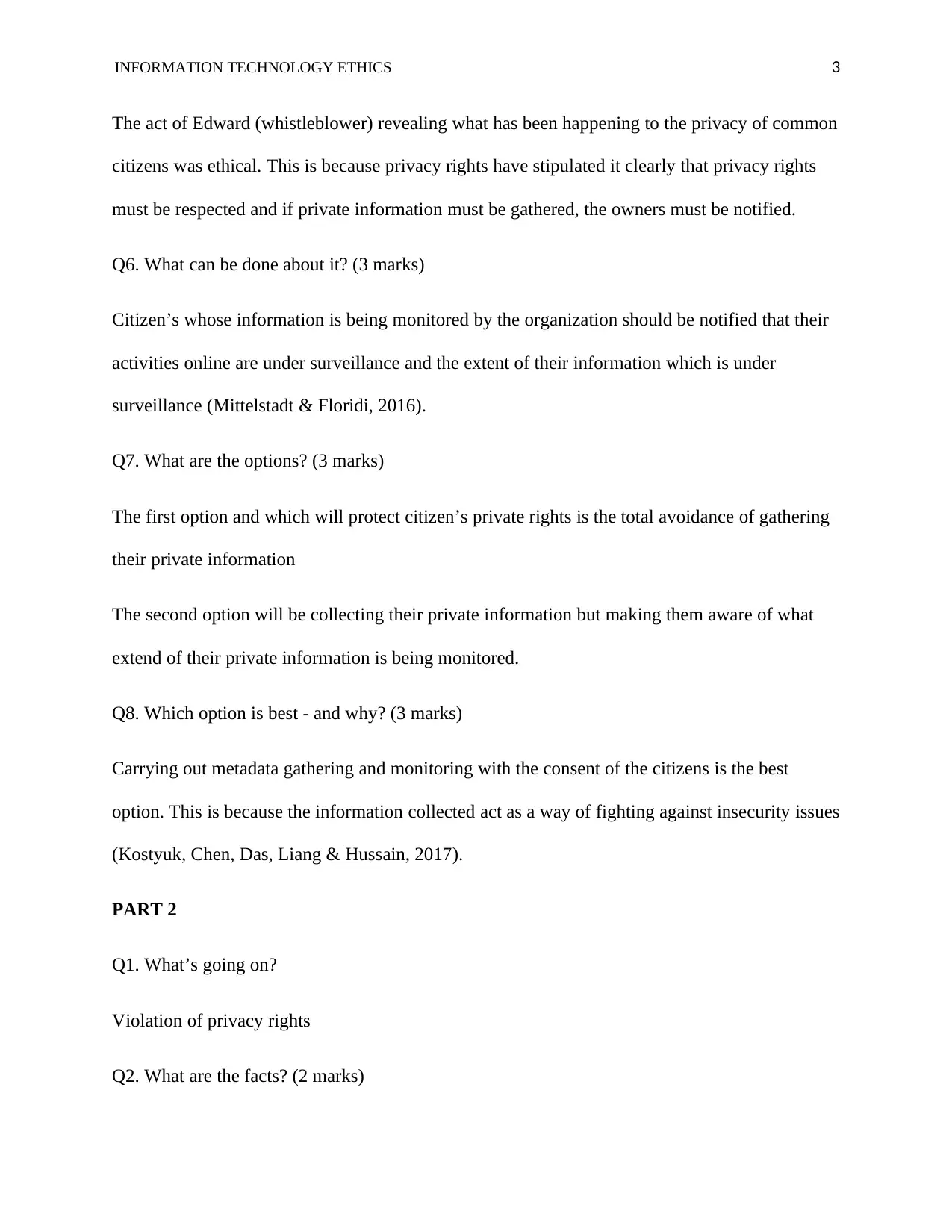
INFORMATION TECHNOLOGY ETHICS 3
The act of Edward (whistleblower) revealing what has been happening to the privacy of common
citizens was ethical. This is because privacy rights have stipulated it clearly that privacy rights
must be respected and if private information must be gathered, the owners must be notified.
Q6. What can be done about it? (3 marks)
Citizen’s whose information is being monitored by the organization should be notified that their
activities online are under surveillance and the extent of their information which is under
surveillance (Mittelstadt & Floridi, 2016).
Q7. What are the options? (3 marks)
The first option and which will protect citizen’s private rights is the total avoidance of gathering
their private information
The second option will be collecting their private information but making them aware of what
extend of their private information is being monitored.
Q8. Which option is best - and why? (3 marks)
Carrying out metadata gathering and monitoring with the consent of the citizens is the best
option. This is because the information collected act as a way of fighting against insecurity issues
(Kostyuk, Chen, Das, Liang & Hussain, 2017).
PART 2
Q1. What’s going on?
Violation of privacy rights
Q2. What are the facts? (2 marks)
The act of Edward (whistleblower) revealing what has been happening to the privacy of common
citizens was ethical. This is because privacy rights have stipulated it clearly that privacy rights
must be respected and if private information must be gathered, the owners must be notified.
Q6. What can be done about it? (3 marks)
Citizen’s whose information is being monitored by the organization should be notified that their
activities online are under surveillance and the extent of their information which is under
surveillance (Mittelstadt & Floridi, 2016).
Q7. What are the options? (3 marks)
The first option and which will protect citizen’s private rights is the total avoidance of gathering
their private information
The second option will be collecting their private information but making them aware of what
extend of their private information is being monitored.
Q8. Which option is best - and why? (3 marks)
Carrying out metadata gathering and monitoring with the consent of the citizens is the best
option. This is because the information collected act as a way of fighting against insecurity issues
(Kostyuk, Chen, Das, Liang & Hussain, 2017).
PART 2
Q1. What’s going on?
Violation of privacy rights
Q2. What are the facts? (2 marks)
⊘ This is a preview!⊘
Do you want full access?
Subscribe today to unlock all pages.

Trusted by 1+ million students worldwide
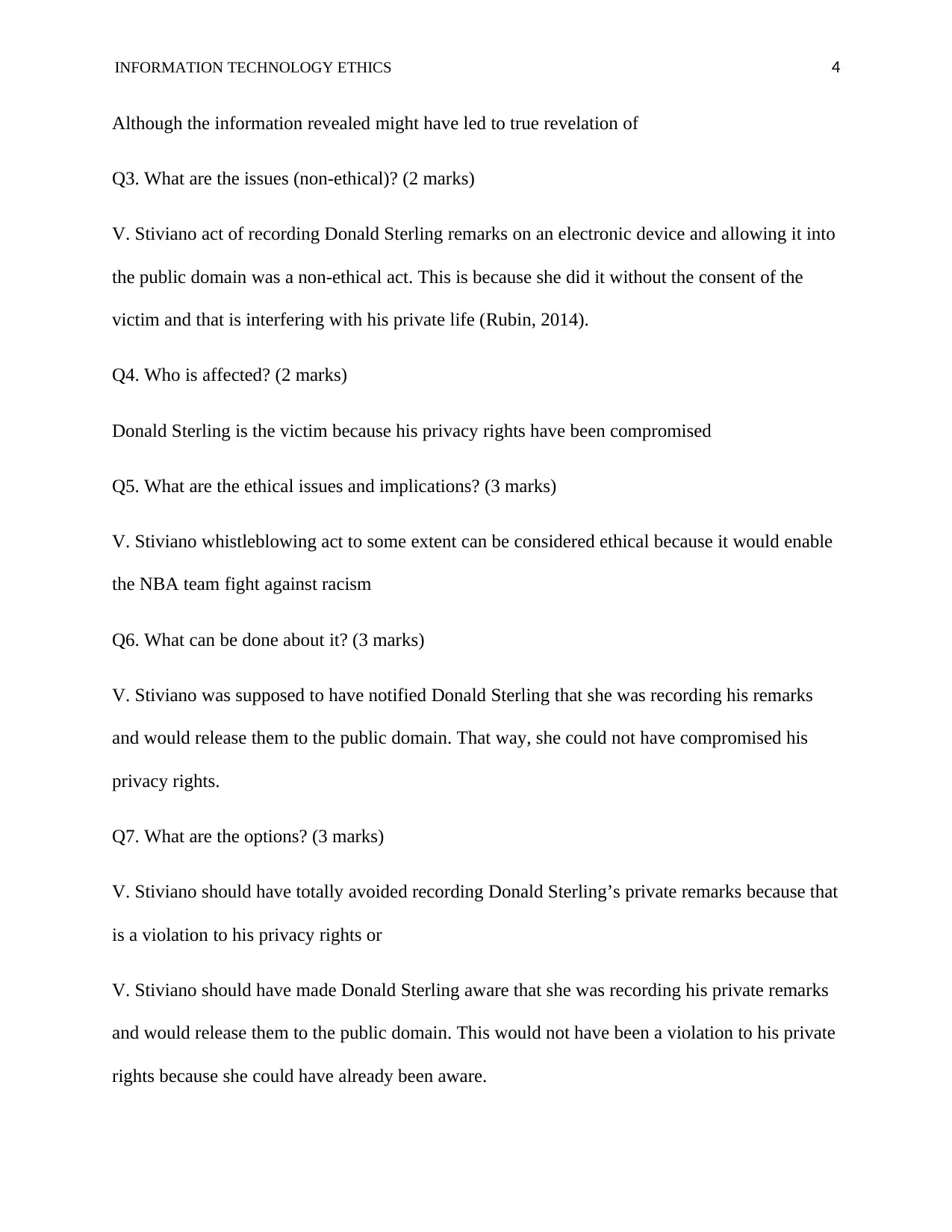
INFORMATION TECHNOLOGY ETHICS 4
Although the information revealed might have led to true revelation of
Q3. What are the issues (non-ethical)? (2 marks)
V. Stiviano act of recording Donald Sterling remarks on an electronic device and allowing it into
the public domain was a non-ethical act. This is because she did it without the consent of the
victim and that is interfering with his private life (Rubin, 2014).
Q4. Who is affected? (2 marks)
Donald Sterling is the victim because his privacy rights have been compromised
Q5. What are the ethical issues and implications? (3 marks)
V. Stiviano whistleblowing act to some extent can be considered ethical because it would enable
the NBA team fight against racism
Q6. What can be done about it? (3 marks)
V. Stiviano was supposed to have notified Donald Sterling that she was recording his remarks
and would release them to the public domain. That way, she could not have compromised his
privacy rights.
Q7. What are the options? (3 marks)
V. Stiviano should have totally avoided recording Donald Sterling’s private remarks because that
is a violation to his privacy rights or
V. Stiviano should have made Donald Sterling aware that she was recording his private remarks
and would release them to the public domain. This would not have been a violation to his private
rights because she could have already been aware.
Although the information revealed might have led to true revelation of
Q3. What are the issues (non-ethical)? (2 marks)
V. Stiviano act of recording Donald Sterling remarks on an electronic device and allowing it into
the public domain was a non-ethical act. This is because she did it without the consent of the
victim and that is interfering with his private life (Rubin, 2014).
Q4. Who is affected? (2 marks)
Donald Sterling is the victim because his privacy rights have been compromised
Q5. What are the ethical issues and implications? (3 marks)
V. Stiviano whistleblowing act to some extent can be considered ethical because it would enable
the NBA team fight against racism
Q6. What can be done about it? (3 marks)
V. Stiviano was supposed to have notified Donald Sterling that she was recording his remarks
and would release them to the public domain. That way, she could not have compromised his
privacy rights.
Q7. What are the options? (3 marks)
V. Stiviano should have totally avoided recording Donald Sterling’s private remarks because that
is a violation to his privacy rights or
V. Stiviano should have made Donald Sterling aware that she was recording his private remarks
and would release them to the public domain. This would not have been a violation to his private
rights because she could have already been aware.
Paraphrase This Document
Need a fresh take? Get an instant paraphrase of this document with our AI Paraphraser
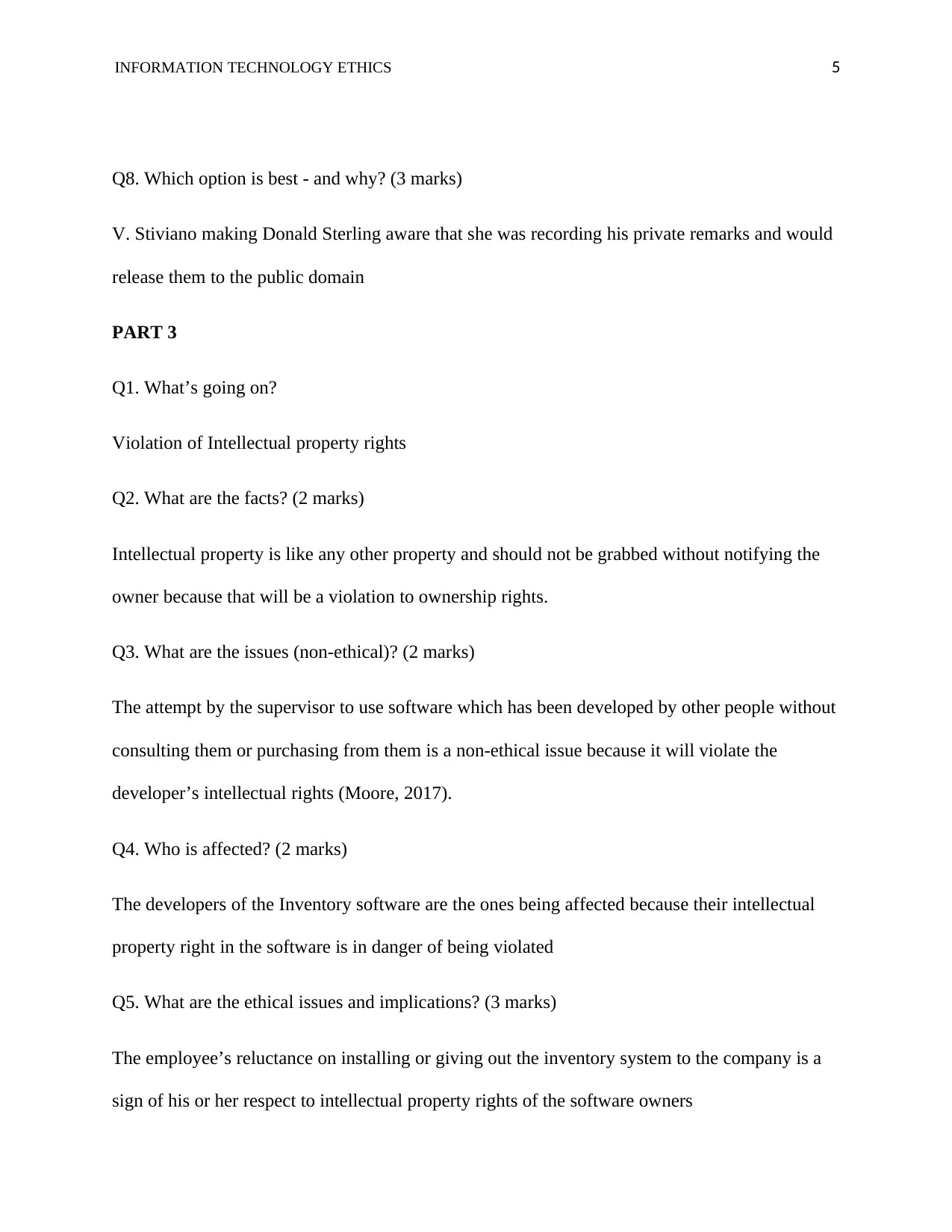
INFORMATION TECHNOLOGY ETHICS 5
Q8. Which option is best - and why? (3 marks)
V. Stiviano making Donald Sterling aware that she was recording his private remarks and would
release them to the public domain
PART 3
Q1. What’s going on?
Violation of Intellectual property rights
Q2. What are the facts? (2 marks)
Intellectual property is like any other property and should not be grabbed without notifying the
owner because that will be a violation to ownership rights.
Q3. What are the issues (non-ethical)? (2 marks)
The attempt by the supervisor to use software which has been developed by other people without
consulting them or purchasing from them is a non-ethical issue because it will violate the
developer’s intellectual rights (Moore, 2017).
Q4. Who is affected? (2 marks)
The developers of the Inventory software are the ones being affected because their intellectual
property right in the software is in danger of being violated
Q5. What are the ethical issues and implications? (3 marks)
The employee’s reluctance on installing or giving out the inventory system to the company is a
sign of his or her respect to intellectual property rights of the software owners
Q8. Which option is best - and why? (3 marks)
V. Stiviano making Donald Sterling aware that she was recording his private remarks and would
release them to the public domain
PART 3
Q1. What’s going on?
Violation of Intellectual property rights
Q2. What are the facts? (2 marks)
Intellectual property is like any other property and should not be grabbed without notifying the
owner because that will be a violation to ownership rights.
Q3. What are the issues (non-ethical)? (2 marks)
The attempt by the supervisor to use software which has been developed by other people without
consulting them or purchasing from them is a non-ethical issue because it will violate the
developer’s intellectual rights (Moore, 2017).
Q4. Who is affected? (2 marks)
The developers of the Inventory software are the ones being affected because their intellectual
property right in the software is in danger of being violated
Q5. What are the ethical issues and implications? (3 marks)
The employee’s reluctance on installing or giving out the inventory system to the company is a
sign of his or her respect to intellectual property rights of the software owners
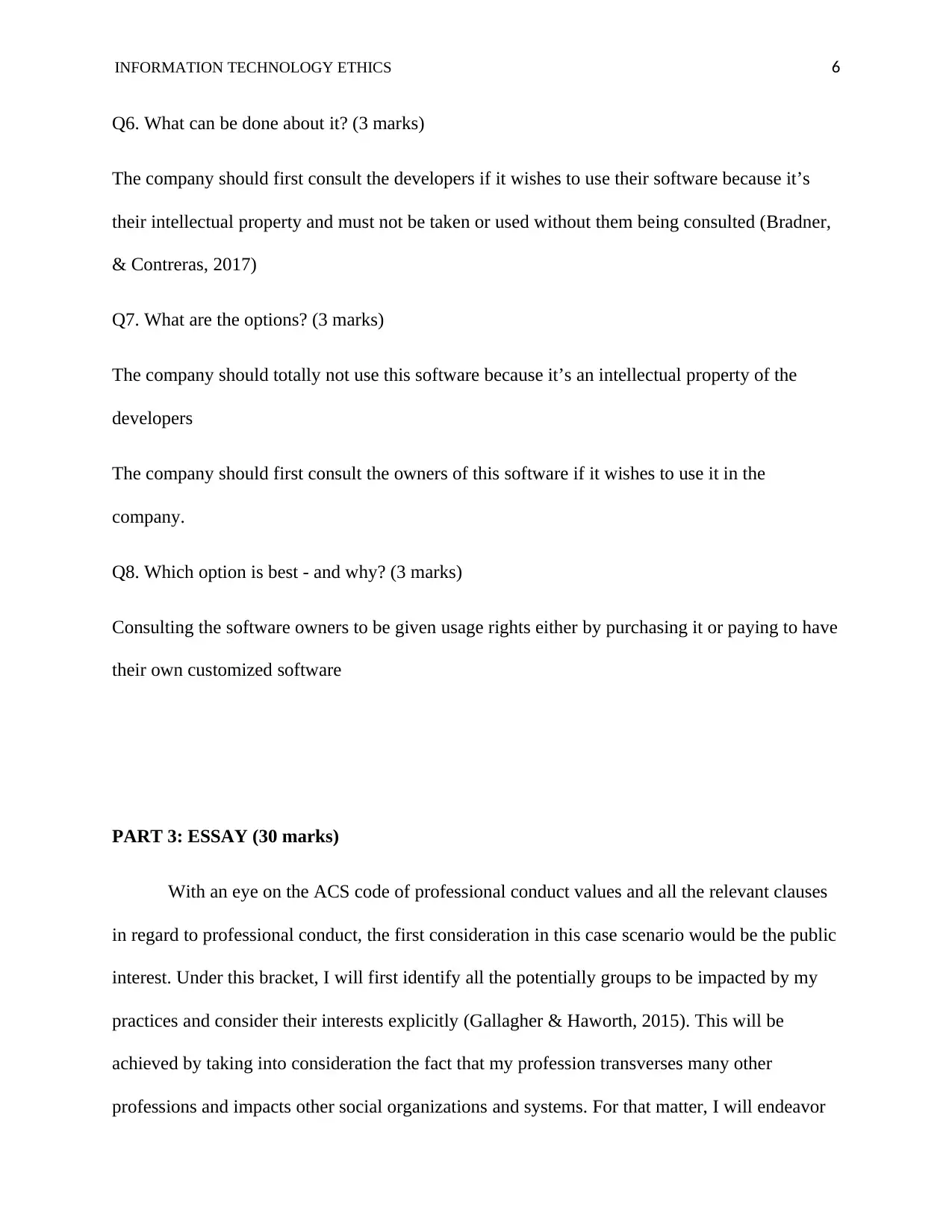
INFORMATION TECHNOLOGY ETHICS 6
Q6. What can be done about it? (3 marks)
The company should first consult the developers if it wishes to use their software because it’s
their intellectual property and must not be taken or used without them being consulted (Bradner,
& Contreras, 2017)
Q7. What are the options? (3 marks)
The company should totally not use this software because it’s an intellectual property of the
developers
The company should first consult the owners of this software if it wishes to use it in the
company.
Q8. Which option is best - and why? (3 marks)
Consulting the software owners to be given usage rights either by purchasing it or paying to have
their own customized software
PART 3: ESSAY (30 marks)
With an eye on the ACS code of professional conduct values and all the relevant clauses
in regard to professional conduct, the first consideration in this case scenario would be the public
interest. Under this bracket, I will first identify all the potentially groups to be impacted by my
practices and consider their interests explicitly (Gallagher & Haworth, 2015). This will be
achieved by taking into consideration the fact that my profession transverses many other
professions and impacts other social organizations and systems. For that matter, I will endeavor
Q6. What can be done about it? (3 marks)
The company should first consult the developers if it wishes to use their software because it’s
their intellectual property and must not be taken or used without them being consulted (Bradner,
& Contreras, 2017)
Q7. What are the options? (3 marks)
The company should totally not use this software because it’s an intellectual property of the
developers
The company should first consult the owners of this software if it wishes to use it in the
company.
Q8. Which option is best - and why? (3 marks)
Consulting the software owners to be given usage rights either by purchasing it or paying to have
their own customized software
PART 3: ESSAY (30 marks)
With an eye on the ACS code of professional conduct values and all the relevant clauses
in regard to professional conduct, the first consideration in this case scenario would be the public
interest. Under this bracket, I will first identify all the potentially groups to be impacted by my
practices and consider their interests explicitly (Gallagher & Haworth, 2015). This will be
achieved by taking into consideration the fact that my profession transverses many other
professions and impacts other social organizations and systems. For that matter, I will endeavor
⊘ This is a preview!⊘
Do you want full access?
Subscribe today to unlock all pages.

Trusted by 1+ million students worldwide
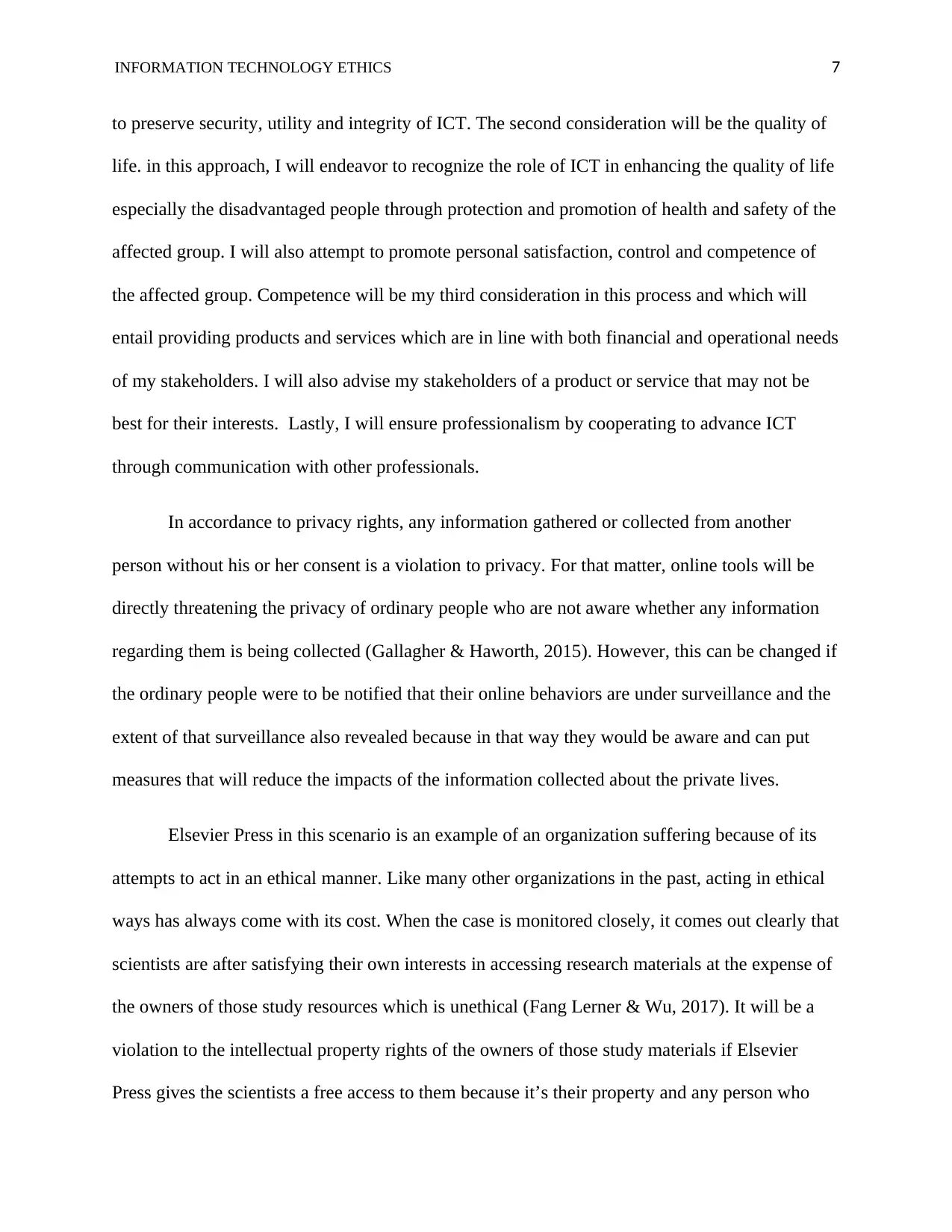
INFORMATION TECHNOLOGY ETHICS 7
to preserve security, utility and integrity of ICT. The second consideration will be the quality of
life. in this approach, I will endeavor to recognize the role of ICT in enhancing the quality of life
especially the disadvantaged people through protection and promotion of health and safety of the
affected group. I will also attempt to promote personal satisfaction, control and competence of
the affected group. Competence will be my third consideration in this process and which will
entail providing products and services which are in line with both financial and operational needs
of my stakeholders. I will also advise my stakeholders of a product or service that may not be
best for their interests. Lastly, I will ensure professionalism by cooperating to advance ICT
through communication with other professionals.
In accordance to privacy rights, any information gathered or collected from another
person without his or her consent is a violation to privacy. For that matter, online tools will be
directly threatening the privacy of ordinary people who are not aware whether any information
regarding them is being collected (Gallagher & Haworth, 2015). However, this can be changed if
the ordinary people were to be notified that their online behaviors are under surveillance and the
extent of that surveillance also revealed because in that way they would be aware and can put
measures that will reduce the impacts of the information collected about the private lives.
Elsevier Press in this scenario is an example of an organization suffering because of its
attempts to act in an ethical manner. Like many other organizations in the past, acting in ethical
ways has always come with its cost. When the case is monitored closely, it comes out clearly that
scientists are after satisfying their own interests in accessing research materials at the expense of
the owners of those study resources which is unethical (Fang Lerner & Wu, 2017). It will be a
violation to the intellectual property rights of the owners of those study materials if Elsevier
Press gives the scientists a free access to them because it’s their property and any person who
to preserve security, utility and integrity of ICT. The second consideration will be the quality of
life. in this approach, I will endeavor to recognize the role of ICT in enhancing the quality of life
especially the disadvantaged people through protection and promotion of health and safety of the
affected group. I will also attempt to promote personal satisfaction, control and competence of
the affected group. Competence will be my third consideration in this process and which will
entail providing products and services which are in line with both financial and operational needs
of my stakeholders. I will also advise my stakeholders of a product or service that may not be
best for their interests. Lastly, I will ensure professionalism by cooperating to advance ICT
through communication with other professionals.
In accordance to privacy rights, any information gathered or collected from another
person without his or her consent is a violation to privacy. For that matter, online tools will be
directly threatening the privacy of ordinary people who are not aware whether any information
regarding them is being collected (Gallagher & Haworth, 2015). However, this can be changed if
the ordinary people were to be notified that their online behaviors are under surveillance and the
extent of that surveillance also revealed because in that way they would be aware and can put
measures that will reduce the impacts of the information collected about the private lives.
Elsevier Press in this scenario is an example of an organization suffering because of its
attempts to act in an ethical manner. Like many other organizations in the past, acting in ethical
ways has always come with its cost. When the case is monitored closely, it comes out clearly that
scientists are after satisfying their own interests in accessing research materials at the expense of
the owners of those study resources which is unethical (Fang Lerner & Wu, 2017). It will be a
violation to the intellectual property rights of the owners of those study materials if Elsevier
Press gives the scientists a free access to them because it’s their property and any person who
Paraphrase This Document
Need a fresh take? Get an instant paraphrase of this document with our AI Paraphraser
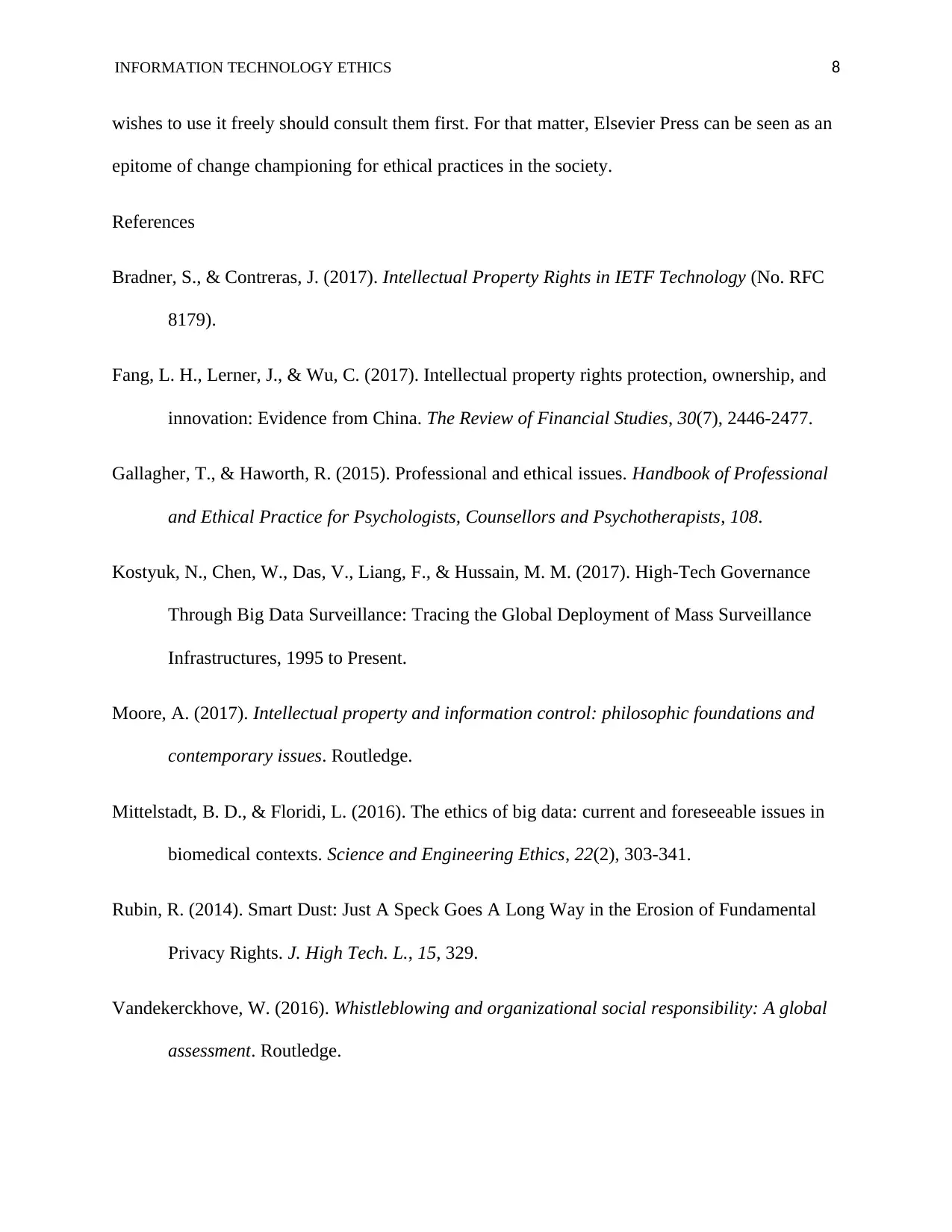
INFORMATION TECHNOLOGY ETHICS 8
wishes to use it freely should consult them first. For that matter, Elsevier Press can be seen as an
epitome of change championing for ethical practices in the society.
References
Bradner, S., & Contreras, J. (2017). Intellectual Property Rights in IETF Technology (No. RFC
8179).
Fang, L. H., Lerner, J., & Wu, C. (2017). Intellectual property rights protection, ownership, and
innovation: Evidence from China. The Review of Financial Studies, 30(7), 2446-2477.
Gallagher, T., & Haworth, R. (2015). Professional and ethical issues. Handbook of Professional
and Ethical Practice for Psychologists, Counsellors and Psychotherapists, 108.
Kostyuk, N., Chen, W., Das, V., Liang, F., & Hussain, M. M. (2017). High-Tech Governance
Through Big Data Surveillance: Tracing the Global Deployment of Mass Surveillance
Infrastructures, 1995 to Present.
Moore, A. (2017). Intellectual property and information control: philosophic foundations and
contemporary issues. Routledge.
Mittelstadt, B. D., & Floridi, L. (2016). The ethics of big data: current and foreseeable issues in
biomedical contexts. Science and Engineering Ethics, 22(2), 303-341.
Rubin, R. (2014). Smart Dust: Just A Speck Goes A Long Way in the Erosion of Fundamental
Privacy Rights. J. High Tech. L., 15, 329.
Vandekerckhove, W. (2016). Whistleblowing and organizational social responsibility: A global
assessment. Routledge.
wishes to use it freely should consult them first. For that matter, Elsevier Press can be seen as an
epitome of change championing for ethical practices in the society.
References
Bradner, S., & Contreras, J. (2017). Intellectual Property Rights in IETF Technology (No. RFC
8179).
Fang, L. H., Lerner, J., & Wu, C. (2017). Intellectual property rights protection, ownership, and
innovation: Evidence from China. The Review of Financial Studies, 30(7), 2446-2477.
Gallagher, T., & Haworth, R. (2015). Professional and ethical issues. Handbook of Professional
and Ethical Practice for Psychologists, Counsellors and Psychotherapists, 108.
Kostyuk, N., Chen, W., Das, V., Liang, F., & Hussain, M. M. (2017). High-Tech Governance
Through Big Data Surveillance: Tracing the Global Deployment of Mass Surveillance
Infrastructures, 1995 to Present.
Moore, A. (2017). Intellectual property and information control: philosophic foundations and
contemporary issues. Routledge.
Mittelstadt, B. D., & Floridi, L. (2016). The ethics of big data: current and foreseeable issues in
biomedical contexts. Science and Engineering Ethics, 22(2), 303-341.
Rubin, R. (2014). Smart Dust: Just A Speck Goes A Long Way in the Erosion of Fundamental
Privacy Rights. J. High Tech. L., 15, 329.
Vandekerckhove, W. (2016). Whistleblowing and organizational social responsibility: A global
assessment. Routledge.
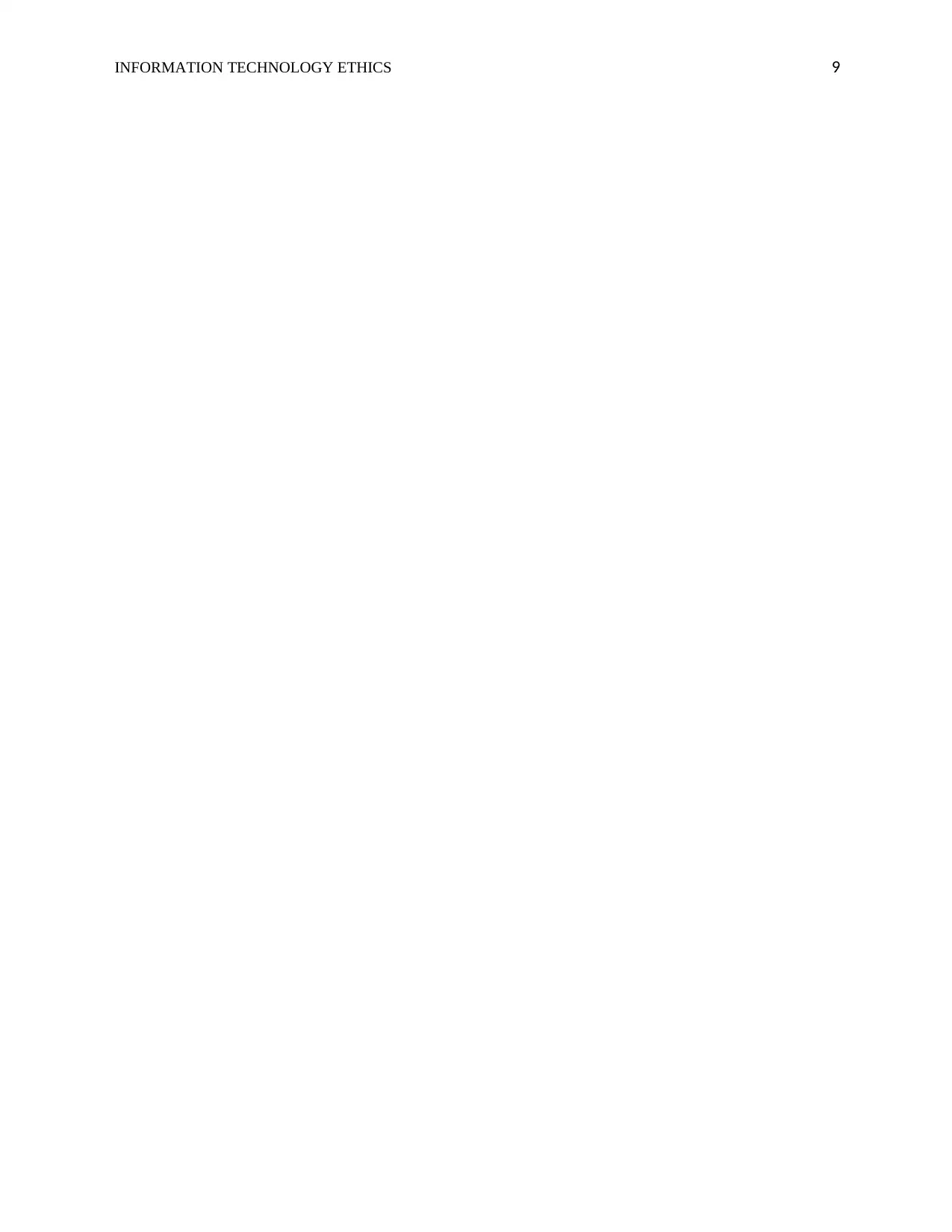
INFORMATION TECHNOLOGY ETHICS 9
⊘ This is a preview!⊘
Do you want full access?
Subscribe today to unlock all pages.

Trusted by 1+ million students worldwide
1 out of 9
Related Documents
Your All-in-One AI-Powered Toolkit for Academic Success.
+13062052269
info@desklib.com
Available 24*7 on WhatsApp / Email
![[object Object]](/_next/static/media/star-bottom.7253800d.svg)
Unlock your academic potential
Copyright © 2020–2025 A2Z Services. All Rights Reserved. Developed and managed by ZUCOL.





